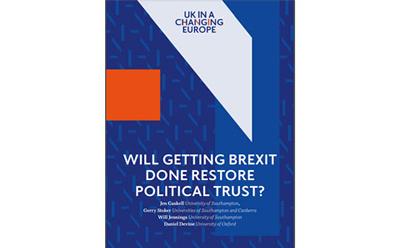Will getting Brexit done be sufficient to restore public trust?

The conclusion of a recent Trustgov report drawing on evidence from focus groups conducted during the summer of 2020 is that getting Brexit done may not deliver a restoration of trust in politics or necessarily lead to sustained support for the PM and the government. The report was written by Dr. Jennifer Gaskell, a research fellow in the Department of Political Science and International Relation at Southampton, in collaboration with Professor Will Jennings, Professor Gerry Stoker and Dr. Dan Devine.
The report highlights five reasons why getting Brexit done might not be sufficient to restore public trust.
- The expectations that politicians or government could be trusted to deliver a better life for them are generally low. There is a desire to trust among citizens, but also a sense that their yearning is likely to remain unfulfilled.
- The Covid-19 crisis has had a major impact through diverting public attention onto both the government’s direct management of the pandemic and its fallout for the economy, the health system and education. There are high levels of latent trust in government to protect people in a crisis – trust as a leap of faith in government, even as people express cynicism or criticism of government on more specific grounds. As failings in managing Covid-19 become more strongly evident that latent trust gives way to returning doubts and sarcastic humour at the government’s expense.
- The PM and his government are trusted on the issue of Brexit, but the benefit from that is limited as Brexit is largely seen as already done by both Leavers and Remainers and credit for that allocated happily by the former and fatalistically by the latter; voters on both sides of the Brexit divide seem ready to move on. Validating further the idea for both Leavers and Remainers that getting Brexit done is a card that has already been played.
- Citizens make trust judgements using a combination of analytical and emotional reasoning, drawing on a variety of sources of information not all of which can be framed or driven by elites. People’s trust judgements are also updated over time in response to events. The dominant self-image of voters is as sceptical observers, judging trust by what they see.
- Future battles for the trust of the public are likely to be focused on a postCovid-19 recovery. As for the prospects for the post-Brexit deal (or no deal), anxiety and cynicism were the dominant themes. Most participants expected a need to delay the negotiations (even after the deadline had passed for an extension), many expressed fears over the double whammy of simultaneous economic shocks of Brexit and Covid-19. There was a widespread cynicism especially among Leavers that government would try to ‘hide behind Covid-19’ when it came to any negative economic impacts of Brexit. If Brexit is revived in the public mind, through wrangling over trade deals with the EU, there is a risk that it undermines rather than enhances trust in the government, which is heavily premised on having got Brexit done.
The full report can be accessed at this downloadable pdf.
Trustgov is a research project of the University of Southampton supported by an award from the ESRC’s UK in a Changing Europe programme and by the ESRC grant ‘Trust and Trustworthiness in National and Global Governance’. For more information about Trustgov.
.JPG_SIA_JPG_fit_to_width_SQUARE.jpg)

